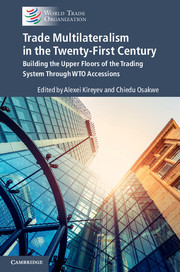 Trade Multilateralism in the Twenty-First Century
Trade Multilateralism in the Twenty-First Century from PART III - Accessions Acquis: Thematic Perspectives and Implementation Challenges
Published online by Cambridge University Press: 28 November 2017
The book you are about to close picked up on the evolving discussion on accessions and trade multilateralism. The first book on the subject, WTO Accessions and Trade Multilateralism: Case Studies and Lessons from the WTO at Twenty, looked back. It took stock of two decades of accessions to the WTO, their welfare and development outcomes, the resulting improvements to market access, and their contribution to domestic reforms and to the rules-based multilateral trading system. It shone a powerful light on the GATT/WTO accession procedure – a process hitherto viewed as lacking transparency and complicated by its esoteric vocabulary and apparent detachment from the day-to-day conduct of trade.
This book looks forward. It focuses on the future of the multilateral trading system and the role of accessions in shaping it. It highlights the challenges of maintaining the system in a global economic and trade policy environment marked by radical transformation and uncertainty accentuated by fast-paced technological changes.
Clearly, the multilateral trading system needs to transform and adapt to this continually evolving environment. While it must remain a ballast for stability and global order, for policy relevance it must also adjust to the complex realities of a different age, an age in which one size cannot possibly fit all. The architecture of the rules-based system requires flexibility to adapt to the different needs of its members in different configurations, ranging from those focused on domestic policy reforms to those motivated by bilateral, plurilateral or regional trade integration priorities. A self-learning and adaptive multilateralism can accommodate these opposite pulls and pressures in a rules-based order. But multilateralism is only one piece of the puzzle and its abundant benefits are accompanied by a price. The price of multilateralism is constant adaptation, operation in different formats and in step with a complex reality. As argued elsewhere, there is a case for a ‘messy’ multilateralism, because ‘multilateralism is not one thing, but many’ (Haass, 2010).
The new realities of the twenty-first century require an upgrade of the multilateral trading system by erecting its upper floors on the foundation of the existing trade rules and the accumulated acquis.
To save this book to your Kindle, first ensure [email protected] is added to your Approved Personal Document E-mail List under your Personal Document Settings on the Manage Your Content and Devices page of your Amazon account. Then enter the ‘name’ part of your Kindle email address below. Find out more about saving to your Kindle.
Note you can select to save to either the @free.kindle.com or @kindle.com variations. ‘@free.kindle.com’ emails are free but can only be saved to your device when it is connected to wi-fi. ‘@kindle.com’ emails can be delivered even when you are not connected to wi-fi, but note that service fees apply.
Find out more about the Kindle Personal Document Service.
To save content items to your account, please confirm that you agree to abide by our usage policies. If this is the first time you use this feature, you will be asked to authorise Cambridge Core to connect with your account. Find out more about saving content to Dropbox.
To save content items to your account, please confirm that you agree to abide by our usage policies. If this is the first time you use this feature, you will be asked to authorise Cambridge Core to connect with your account. Find out more about saving content to Google Drive.